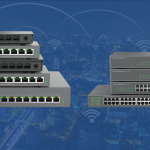Recently, we had the opportunity to chat with Dmitry Baev, the Director of Product Development of Industry Dynamics and makers of VoiceGear—an integrated Skype gateway that is entirely plug-and-play and supports a variety of analog, digital, SIP, and Hybrid PBX systems.
Listen to the podcast or read a transcription of our call below.
[VoIPon] Please tell us why a customer would want to integrate their PBX with Skype. Is it reliable for business calls?
[Dmitry Baev, Industry Dynamics] Yes. First of all let me briefly describe what are the major use cases that we’ve seen our customers using with VoiceGear Skype Gateways. And there is about five or six primary use cases that we’ve seen. And, some of the most popular ones that we’ve seen would be something that we call Skype trunking.
By virtue of using the VoiceGear Skype Gateway with your PBX system, it allows all of your office staff to take advantage of cheap outgoing calls via Skype out. This can be calls made to other Skype users, which are absolutely free, those calls are made Skype to Skype, and also calls that are made to regular land lines and mobile numbers and those are charged at the minimal Skype out rates, which typically start at about 2 cents a minute, or there are some unlimited subscriptions that are country based.
And there are other use cases where customers are utilizing the Skype click to call button functionality. If you are some sort of a call centre, or you are an e-commerce site, then you can have a Skype click to call button placed on your website, and then any customer who comes to visit your website, clicks on the button and that makes a Skype call from the customer directly to the VoiceGear connect system, which is connected to your PBX. Then the call is transferred from Skype to your PBX and off to any department within your company.
Other use cases we’ve seen prominent with some companies is actually with their mobile workforce. So in this case, if you have staff who are travelling on business, perhaps they have Skype running on their laptops or mobile phones. And in this case, instead of having them pay for roaming calls when they want to call back to their office, or head office needs to pay long distance in order to reach out to an employee who is travelling on business, now this communication can be done Skype-to-Skype. So a VoiceGear connect gateway which is placed in your office, can be used to in initiate a Skype call to a mobile employee who has Skype running on their laptop or mobile phone or any means that they have access to Skype.
And recently Skype has introduced services for iPhone, for Blackberry and for a number of other mobile platforms. So mobile communication is very big, and by having VoiceGear installed in your office, we are essentially creating a free link between any of your offices and the mobile workforce.
A last use case which is also very popular with larger enterprise companies is global presence. So in this case, Skype offers virtual phone numbers around the world. And in this case, if you have offices in multiple countries, or you want to provide local dial in numbers for customers in foreign countries, you can use Skype online numbers. So basically, any customer calling to that online number will instantly reach the VoiceGear Connect Gateway which is connected to your PBX. The call will get transferred to your PBX, as if it’s a local call, made to your local phone number, wherever your office is located. And of course, in this case you’re saving money because you’re not paying for those incoming calls, and also it’s a local call for the customer.
[VoIPon] We understand that this product works with a company’s existing PBX using SIP. Who is the typical customer that would purchase such a system?
[DB] One thing I’d like to mention here is that we do fully support SIP with a full range of PBX systems, but it is not limited to SIP connectivity only. We in fact support analogue connections as well as ISDN PRI connections. So in fact, VoiceGear Connect systems can work with, I would say, pretty much any PBX: SIP, analogue or digital.
And the second aspect here, who is the typical customer—this really depends on the business cases we just covered.
We’ve seen a lot of use from the university type of customers. And universities are typically using VoiceGear systems for accepting incoming Skype calls. A lot of universities want to publish their Skype account or Skype click to call buttons to let potential students get in touch with the university. Especially those where there is a large number of international students.
We’ve seen a lot of hotels and hospitality type businesses interested in the VoiceGear system.
Going beyond that, we’ve seen all types of use from various government organizations. VoIP service providers, especially those who want to give their existing subscribers access to Skype services, we’ve also seen big use from various international health care agencies.
[VoIPon] At what point does the upfront cost make sense for a business?
[DB] So, in most cases what we’ve seen is the return on investment is typically projected to be under six months. So, even as you said, there is some up-front cost for obviously purchasing such equipment. A good thing is that the installation process is very seamless. So there is not a lot of time for installation and configuration, it’s very much straightforward.
Obviously the cost savings come from a number of places. First of all, is the free or really cheap outbound calling—integration of mobile workforce into your PBX system, that’s another big savings. In cases where organizations are deploying this type of technology to receive inbound calls, there are also big savings on 1800 numbers.
[VoIPon] What’s next for Industry Dynamics?
[DB] Yes, certainly. We’ve seen the Skype market developing over the past few years. Over the past year, we’ve seen Skype pushing heavily into the business environment, which perfectly aligns with what Industry Dynamics is doing here.
And towards that end, Skype is releasing a new service which is called Skype for SIP, and this service is oriented towards businesses. The value of this service is Skype really trying to become more of, if you will, a VoIP service provider. Because Skype has over 500 million users, who are mostly consumer users, the next step for them would be to convert some of those consumer users who are using Skype at home, and push them to start using Skype at work.
So what Skype has done, with Skype for SIP is they’re basically allowing you to connect your VoIP enabled PBX system to Skype by virtue of having SIP trunks from the PBX to the Skype server. And this is very similar to what a VoIP service provider is.
This service is based on subscriptions so there is a cost per line every month that the customer would have to pay.
And towards that end, Industry Dynamics is actually developing a new product which is slated to come out about a month from today and this is going to be called VoiceGear Duo. It is a gateway that enables any legacy PBX system. So if you have a PBX or a key system, which has analogue ports, either analogue extensions or analogue line ports, it can be used with a Voice Gear Duo gateway to be connected to this new Skype SIP service. So this is really looking out to what is the next thing coming from Skype.
[VoIPon] We’ve been asking our podcast participants their opinion on the state of the market. What can VoIPon’s listeners expect from VoIP and unified communications in the future? Where do you think the market in general is headed?
[DB] Well, one thing for sure is that unified communication is here to stay. There is two sides to this coin. From one end, a lot of people are seeing Skype as a consumer type of service: It gives you voice, it gives you video, chat capabilities, file transfers. But on the other side of the coin, take a look and examine some of the other enterprise unified communications solutions from some of the bigger players in this industry, what you will see is that those players are really giving you all the same features.
So a really, really good high end communications system will give you voice, perhaps it will give you video, perhaps it will have some chat capabilities where everything is built in, will give you some presence capabilities, perhaps file transfer between employees of the same company of course.
If you put these two offerings side by side, it is really interesting to see that what Skype has been doing for many many years now, is actually percolating into the larger enterprise and business environment.
So while a lot of people are still thinking of Skype as a consumer service, we really think that Skype has all the right ingredients to really become a major player in enterprise. And by working closely with Skype, Industry Dynamics is delivering the hardware which is necessary in order to be able to take advantage of the Skype services in a well managed and secure type of setting that an enterprise requires. So by virtue of having VoiceGear system installed along with your IT infrastructure, and your PBX system, you can take advantage of all the Skype features in a secure package tailored specifically for the enterprise use.
Dmitry Baev is the Director of Product Development of Industry Dynamics.





